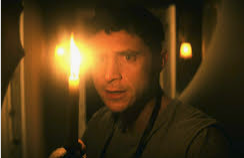The Vigil – Light a Candle because a Dybbuk Awaits and a Shomer Needs Renewal of Faith
By Sue Weston and David Dobkin
As masters of the horror genre know full well, the scariest stories are not those based on science fiction or the supernatural, but rather they know that real terror lies in the things that go bump in the night hiding within the recesses of the human psyche. In writer/director Keith Thomas’s debut film, The Vigil, the shock horror is found in a psycho-thriller set in Chassidic Boro Park; where Jewish mysticism is the basis for the delusions, dreams, and demons designed to scare the daylights out of afficionados of the genre.
The Vigil, which will be released on Video On Demand on February 26, aptly calls itself a “Jewish horror movie.” It incorporates horror-movie tricks, including jump-scares, camera angles intended to render the viewer uncomfortable, flickering lights, mirrors, ominous music, and characters who materialize seemingly from nowhere, all of which merge to ask the question: Is the protagonist, Yakov (the profoundly affecting Dave Davis), going insane or could it be that the house is possessed?
The film explores the issues of mental illness and trauma along with Jewish themes, including guilt faced by Holocaust survivors, assimilation, and faith itself.

The Shomer
Mr. Davis plays an awkward young man, short on faith and funds, who, despite his efforts to escape his community and the trauma of his younger brother’s death, returns to earn a few dollars by acting as the shomer who watches over the body of a Holocaust survivor during the time between death and burial. He is asked to serve by Reb Shulem (Menashe Lustig, last seen in the superb semi-autobiographical Yiddish film, Menashe), who explains that the previous shomer left suddenly. Uh-oh.
A likeable if dysfunctional nebbish, Yakov seems unable to figure out how to deal with the world outside of Boro Park.
The tone is set when he enters the home of the deceased, a relic of the past so dark and dingy, the smells of dust and age leap off the screen. When the widow, Mrs. Litvak (played by delicious Lynn Cohen, who is remembered as Magda on “Sex and the City” as well as Golda Meir in the film, Munich) screams at Yakov to leave before it is too late, the gnawing feeling of gloom is cemented.
Unfazed by the widow’s outburst, Reb Shulem explains that she suffers from dementia and should not bother him throughout the night. However, as Yakov sits with the dead body from midnight until dawn, the night turns out to be anything by peaceful.
The Dybbuk
The recently deceased Mr. Litvak, a survivor of Buchenwald, was for years haunted by memories of Nazis and the deaths he witnessed. Traumatized by the terror, he was unable to free himself from the parasitic dybbuk his widow insists had filled his soul.
In the literature, the dybbuk is described as a tuber-fingered specter with a backward-facing head that looks towards the past. A restless spirit wandering between heaven and earth, it possesses the body of its victim, usually someone who is harboring a secret sin. According to tradition, the power to exorcise a dybbuk is given to those Chassidim accomplished in those arts. According to Mrs. Litvak, once exorcised, the dybbuk returns to the world of the dead and frees the souls it formerly possessed. The only way Yakov can free himself as well as the late-Mr. Litvak is to destroy the dybbuk by burning his face before daybreak.
As the hours tick by, the line between what is real and what a figment of the imagination becomes increasingly blurred. Or maybe it’s just the dybbuk playing games.
Is the dybbuk that had possessed the late-Mr. Litvak now searching for a new body to occupy or is it, rather Yakov’s internal demons? Will confronting his secret sin, admitting his shortcomings, and begging forgiveness suffice?
Mental Health
Mrs. Litvak’s dementia blurs the line between fact and fantasy, making her appearances and conversations all the more unsettling. As a couple, the Litvaks have been intentionally estranged from family, the community in which they find themselves, and life itself, consumed by memories and unfaced fears. Yakov struggles with his own mental health issues, which have prompted him to seek professional help and left him addicted to pills prescribed to deal with his hallucinations and anxiety.
Is any of this reflective of reality or is it just the perception of two highly challenged individuals? Maybe dealing with the dybbuk is precisely what he needs in order to find inner strength.
Leveraging Background
Before pursuing a career as a screenwriter and author of two novels, The Clarity and Dahlia Black, Mr. Thomas worked in medical research in Denver. In between, he took a few detours, including a stint in rabbinical school, earning a master’s in Education.
“But I realized I didn’t want to run a Jewish day school and that the medical thing was probably better,” he says, explaining why he returned to a pre-med curriculum and engaged in clinical research for about ten years, working with children suffering from pediatric asthma and senior adults with Alzheimer’s.
In The Vigil, Thomas leveraged his specialized knowledge in his writing and direction. He manages to create a feeling of dread similar to the anticipation of pulling off a bandage when the patient and the physician are unsure and afraid of what to expect. Intertwining Jewish mysticism with mental-illness delusions, he plays on childhood fears of the dark and the dead and the modern-day adult distress of being cut-off from the world. Yakov’s phone is repeatedly compromised by the dybbuk.
Impeccable Production
In this impeccable production, credible acting is enhanced by switching dialogue between Yiddish and English. The setting and lighting complete the depiction of the Litvaks’ home, a mausoleum frozen in time and steeped in memories, where the unthinkable, possession by a dybbuk, is more than possible.
Best of all, there is hope: After a harrowing night, there may be the light of morning and the possibility of coffee with a nice Jewish girl (Malky Goldman).
It’s fair to say that Mr. Thomas who, in this film, wanted “to tell a personal story that felt universal” was successful. His plan was to portray a contained plot in which the stakes, at first glance, seem small: “One Man, one ritual, and one struggle with a threatening force.”
He admits that the stories that attract him are also “rooted in tangible human experience” and he hopes viewers find something in The Vigil that “haunts you, that burrows like a splinter in your consciousness and leaves you thinking.”
“Even if it’s just for a few heartbeats,” he says.
****
The Jewish Voice and Opinion bases its ratings on how many challahs it pays to buy (rather than make) in order to see the play, show, film, or exhibit being reviewed. (5 Challah is our highest rating) The Vigil received 4 challahs

The Vigil received a Four Challah Rating





